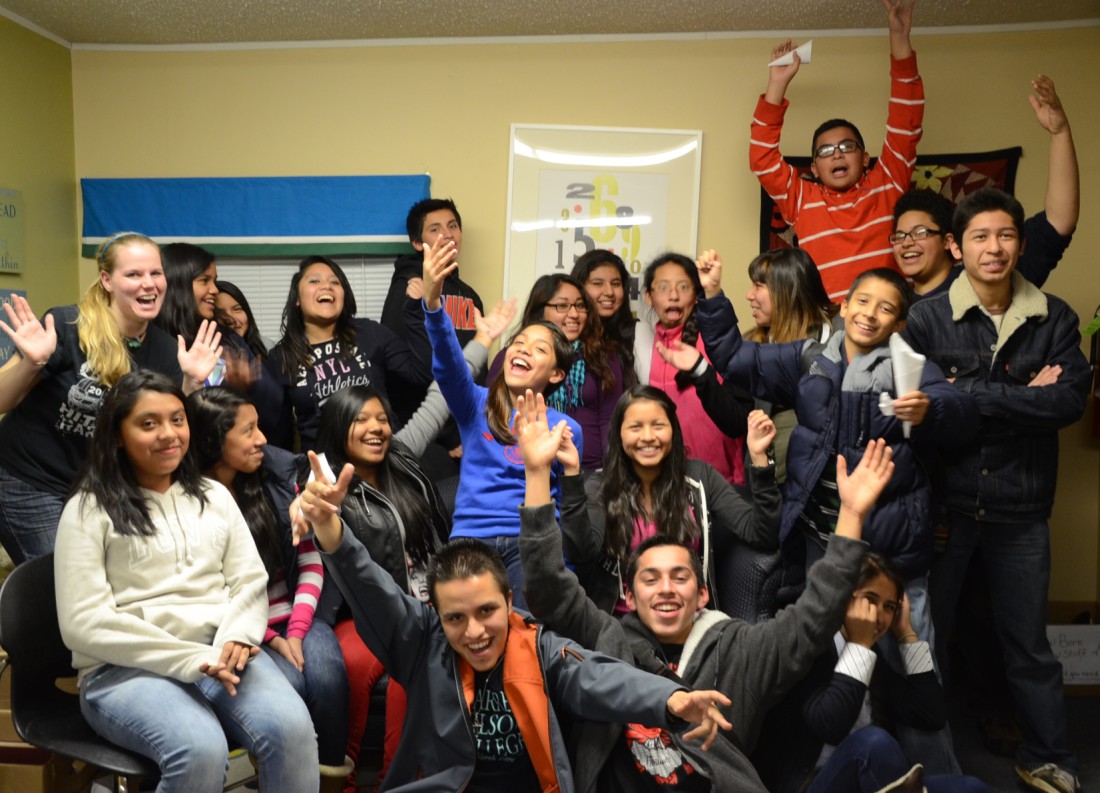The years spent in middle school and high school are challenging for most youth. But for Latino youth, who are often the children of recent immigrants, the challenges can be overwhelming. Many Latino families face isolation due to language and cultural barriers, and many times these Latino middle- and high-school students serve as the connectors between their family and the community.
Norma Brown, the Latino Outreach Coordinator for Children First/Communities In Schools and students from the Bonner Leader Service Learning program at Warren Wilson College collaborated to create a new program called Mentoring and Nurturing Our Students. The name MANOS also refers to the Spanish word for “hands.” The program strives to offer Latino youth a safe and welcoming space, and it available to Latino students in eight grade & high-school students every Monday from 6 p.m. – 8 p.m. Each week Warren Wilson students lead the Latino youth in community and civic engagement activities, assist them with homework and help them prepare for college.
Along with the academic component, this program offers something much more subtle, and in some ways, more valuable: providing Latino youth a place to relax from the pressures and expectations of being a conduit between their families and the greater community.
“I want MANOS to be that place where the students feel inspired to become their generation’s ‘inspirations,’” says Norma.
This program holds a special place in Norma’s heart because she personally understands some of the challenges facing Latino families. She remembers the difficulties she faced as she moved from Argentina with her husband and two young children 13 years ago. Norma works at the Children First/CIS Family Resource Center at Emma where she provides informational referral, emergency assistance and parenting/literacy classes. Always a tireless advocate for educational access, she has helped facilitate numerous college access workshops and works directly with families to remove barriers to their success.
Some barriers to educational success are outside the control of students, including national and state laws, which can be a disincentive for undocumented Latino youth to complete their education. In 2012, the Obama administration issued the Deferred Action on Childhood Arrivals policy, which provides an opportunity for undocumented youth to stay in school, graduate and pursue higher education. The policy allows undocumented youth a two-year, renewable deferment of any deportation and provides temporary legal residency to complete school. This is a temporary solution, but does not implement a permanent path to citizenship for youth that arrived as children.
Additionally, North Carolina does not allow undocumented youth to receive in-state tuition. This means many high-achieving students cannot afford to continue their education. Rep. Susan Fisher, D-Buncombe, joined with other state legislators to introduce HB 904 in 2013 that would allow undocumented NC high school graduates the chance to receive in-state tuition. The bill did not pass.
Latino youth are aware of policy changes that can affect them and their families, and MANOS provides information through workshops and guest speakers. But even amidst larger policy debates, the MANOS program continues to inspire participants as students and leaders. Recently, Norma partnered with Deborah Miles of the Center for Diversity Education to enroll 10 MANOS students in the two-day Me2We Youth Leadership Conference at the YMI. This program focuses on inclusive community building, leadership skills development, intergenerational instruction, experiential learning and peer mentoring.
“The MANOS students were so excited,” says Norma. “They enjoyed all the activities and were given the opportunity to discover talents and build on their interests.”
The conference included workshops on photography and poetry, as well as community engagement and leadership skills.
“This conference is also an opportunity for these students to realize the impact they can have on their own destinies, as well as how they can affect and promote change in the world” Norma adds.
“I like coming to MANOS because of the people and the atmosphere,” says Cirilo Barrera, a tenth grade student from Erwin High School who is returning to MANOS for a second year. “I get to see my friends and the mentors. We work, but we also have fun.”
If you know a Latino eight grader or high-school student who would be interested in attending MANOS, contact Norma Brown at NormaB@childrenfirstbc.org or call 828-252-4810 for more information.
Children First/Communities In Schools of Buncombe County is a local non-profit that provides programs to economically disadvantaged children & families. Children First’s mission is to empower children and their families to reach their full potential through advocacy, education and services. The mission of Communities In Schools is to surround students with a community of support, empowering them to stay in school and achieve in life. www.childrenfirstcisbc.org.
Jodi Ford is the Outreach and Engagement Coordinator and can be reached at 828-620-9091 or JodiF@childrenfirstbc.org.




Si Normita esta ahí, es que es bueno y, seguro les va a ir mejor
Saludos
What a great idea! Norma has a wonderful connection with the Latino community – a trusted friend and helper. Keep up the good work.